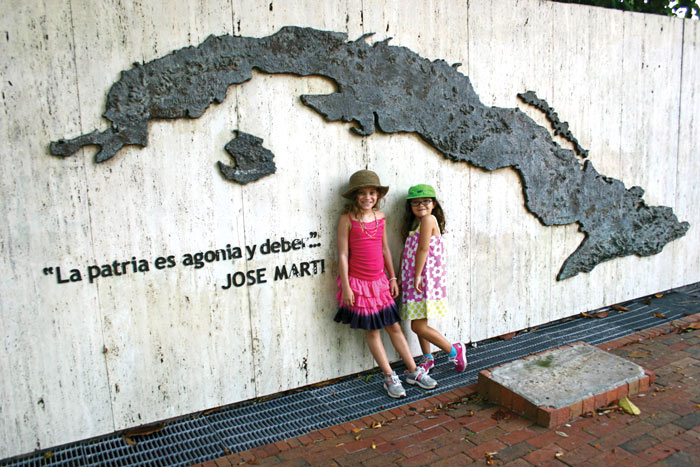
Ignite | Spring 2022
Our Cultures, Our Community: Cuba
A display of international flags on campus proudly represents the diverse ancestries of NEOMED students. When invited to reflect on how the display made them feel, members of the NEOMED community responded with many stories that have been published in The Pulse, the University’s daily enewsletter.
Here, we share a reflection by Sebastián R. Díaz, Ph.D., J.D., associate dean for Quality Initiatives in the College of Medicine.
My old man knew from admiralty law principles that once he set foot on an American airliner, he was officially on U.S. soil. My mother tells me that he was so anxious to set foot on the plane that he tripped over himself as he proceeded back to our seats. We had waited three days at the city of Varadero’s airport, with limited access to bathroom facilities, to be allowed to board one of President Johnson’s Freedom Flights out of Cuba. Before takeoff, after we were all finally seated in the airliner, the stewardesses (as they were called then) came through wearing masks and unapologetically sprayed cans of Lysol throughout the cabin. We all stunk to high heaven.
Less than an hour after takeoff, we entered an entirely different world as refugees to the United States. CIA personnel interviewed my father, and then Catholic Relief Services gave us airline tickets to be relocated to El Paso, Texas, where a church benevolently gave my parents jobs as janitors and provided us a place to live (we later relocated to New Jersey and then Florida). My father, Augusto, had arrived from his native fatherland (Patria) to a new motherland. He was 53 years old, with a wife who didn’t speak a word of English, three boys under the age of five, and roughly $40 in his pocket. To be able to leave Cuba, the deal was this: You had to turn over all your assets (real estate, businesses, even household items catalogued by ñángaro military personnel) in exchange for getting to walk away from an autocracy. My mother, Ana, was against the idea, as she wanted to stay in Cuba and ride out the revolutionary storm. My father unapologetically put his foot down and said, “We’re getting out of here.” I humbly admit my life has been blessed immeasurably by this moment of macho hardheadedness.

The author’s daughters in Little Havana (Miami), near the José Martí memorial
On the same date, March 10, 26 years later, I was living in Athens, Ohio. My roommate Dan, an aspiring grunge-rock musician, woke me up at 2 a.m. to tell me my brother Claudio was on the phone crying (this was pre-cell phones). Between sobs, Claudio told me that our father had just passed away in Orlando, Florida. On the same date, yet again, 46 years after arriving here, we buried my mother next to him there in Orlando, in the Cuban community where our parents had made their American home.
There are many stories sandwiched in between those subsequent occurrences of March 10. And strangely, in a land far away called Northeast Ohio, I am reminded of those memories every time I swipe my card to enter the R building, and glance upwards to my left. La banderita Cubana (the Cuban flag) hangs there silently, thanks in large part to a brilliant idea suggested by a College of Pharmacy student, Ikenna Ogwuegbu, and implemented by my colleague Sandra Emerick, Ed.D. Ikenna Ogwuegbu’s idea was to affirm the diversity of nationalities represented at NEOMED, and so Dr. Emerick surveyed our students to determine which flags to purchase and display. Just about every day, this flag display triggers for me yet another memory among all the March 10ths.
A few years before my old man passed away, I was commenting to him how hard it must have been to leave behind a lifetime of memories, a slew of family members, and his own fatherland. Augusto, who had a penchant for predicting the future (he predicted years before it happened that Fidel Castro would align with the Communists, and that La Revolución would endure), jabbed a finger at me while looking me straight in the eye and responded calmly, “Hijo, someday you might have to take your family and leave the U.S. for the same reason we left Cuba.” Folks, this experiment in democracy is not something to take for granted. One of the ways to avoid that is to affirm the stories — some inspirational, some disheartening — represented among all the flags, including the Stars and Stripes, displayed at NEOMED. I encourage you all to listen carefully to the stories of our students, regardless of from where they come, as their collective experiences comprise NEOMED’s greatest asset.
